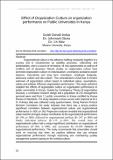| dc.description.abstract | Organizational culture is the adhesive holding companies together in a
country and is characterized by stability processes, collectivity and
predictability, and is a source of recreation, of new opportunities as well as of
conflicts and of dynamics. Recent studies on organization culture have
anchored organization culture on individualism, uncertainty avoidance power
distance, masculinity and long term orientation, employee longevity,
adhocracy culture and clan culture. This contradictions reveal that it remains
unknown of organization culture based on individual values, assumptions,
values and artifacts influence organization performance. This study seeked to
establish the effects of organization culture on organization performance in
public universities in Kenya. Guided by Contingency Theory of organization
structure, a correlation research design and a population of 215 management
personal were used from 11 public universities in Kenya certified by Kenya
Bureau of Standards. The study adopted a census survey with response at 94.4
%. Primary data was collected using questionnaires. Using Pearson Product
Moment Correlation the study indicates that there was a strong positive
significant correlation between organizational culture and organizational
performance (r=.804, p<.05). Regression analyses revealed that organizational
values had the strongest unique contribution to the organizational performance
(β=.394, p=.000), followed by organizational artifacts (β=.347, p=.000) and
finally individual believes (β=.155, p=.001). The overall form of
organizational culture had a unique significant contribution on organizational
performance (β=.804, p=.000), and accounted for 64.6% variance in
organizational performance. The study recommends that universities should
work on ensuring that there are positive believes that can enhance
organizational performance through improving and maintaining quality
management systems basing on the existing culture. | en_US |

